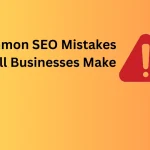Brand SEO refers to optimizing a company’s online presence to enhance its visibility and reputation in search engine results, particularly when users search for the brand’s name or related keywords. It focuses on ensuring that a brand’s website and associated online content rank well in search engine results pages (SERPs) when users search for the brand directly or for terms related to the brand. In this context, we talked about the importance of brand SEO for online success.
Let’s jump into the deep:
Importance of Brand SEO for Online Success
Brand SEO is essential for online success as it helps to build brand awareness, trust, and authority while maximizing visibility and exposure across the web. Investing in brand SEO strategies can yield long-term benefits for your business, driving organic traffic, and fostering customer loyalty.
Brand SEO plays a crucial role in achieving online success for several reasons:
Increased Visibility:
Brand SEO ensures that when users search for your brand name or related terms, your website and other online assets appear prominently in search results. This visibility helps to reinforce brand recognition and attract potential customers.
Trust and Credibility:
Websites that rank well in search engine results are often perceived as more trustworthy and credible by users. A strong brand presence in search results can enhance trust in your brand and encourage users to engage with your content or make a purchase.
Competitive Advantage:
Effective brand SEO allows you to dominate search results for your brand name and related keywords, giving you a competitive advantage. It helps to protect your brand’s online reputation and ensures that users find accurate and positive information about your brand.
Brand Authority:
Consistently appearing at the top of search results for branded keywords establishes your brand as an authority in your industry or niche. This can increase brand loyalty and customer retention as users perceive your brand as a trusted source of information or products.
Maximized Brand Exposure:
Brand SEO extends beyond your website to encompass various online platforms, including social media profiles, local directories, and review sites. Optimizing these platforms ensures that your brand receives maximum exposure across the web, reaching a broader audience and driving more traffic to your website.
Positive User Experience:
A well-optimized brand presence in search results contributes to a positive user experience. Users can quickly find the information they are looking for, leading to higher engagement, lower bounce rates, and ultimately, improved conversions.
Key aspects of brand SEO
Branded Keywords Optimization: Optimizing website content, meta tags, titles, and descriptions with branded keywords to ensure they appear prominently in search results when users search for the brand name or related terms.
Reputation Management: Monitoring and managing online reviews, mentions, and sentiments about the brand to ensure a positive online reputation, which can indirectly impact search engine rankings.
Content Creation and Promotion: Creating high-quality, valuable content that resonates with the brand’s audience and promotes engagement and sharing. This can include blog posts, articles, videos, infographics, and more.
Social Media Optimization: Leveraging social media platforms to enhance brand visibility and engagement, as social signals can indirectly influence search engine rankings.
Local SEO: Optimizing local listings and directories to ensure the brand appears prominently in local search results, especially for brick-and-mortar businesses targeting local customers.
Consistent Branding Across Platforms: Ensuring consistent branding across all online channels, including the website, social media profiles, directory listings, and review platforms.
Also Read
Tips to Do Brand SEO
Implementing effective brand SEO involves a combination of strategies to enhance your brand’s visibility, reputation, and authority in search engine results. Here are some tips to help you with brand SEO:
Optimize Your Website for Branded Keywords:
Ensure that your website’s title tags, meta descriptions, headings, and content include your brand name and relevant branded keywords.
Create dedicated landing pages for key products or services, optimizing them with branded keywords to improve their visibility in search results.
Claim and Optimize Your Google My Business Listing:
Claim your Google My Business listing and ensure that all information, including your business name, address, phone number, and website, is accurate and up to date.
Optimize your Google My Business profile with high-quality images, relevant categories, business hours, and customer reviews to improve your visibility in local search results.
Create High-Quality, Branded Content:
Develop compelling, informative, and engaging content that reflects your brand’s identity and resonates with your target audience.
Incorporate branded keywords naturally within your content while maintaining relevance and readability.
Utilize various content formats, such as blog posts, articles, videos, infographics, and podcasts, to appeal to different types of users and improve your search engine rankings.
Optimize Social Media Profiles:
Optimize your social media profiles with consistent branding, including your logo, cover photo, bio, and website link.
Regularly update your social media profiles with relevant content and engage with your audience to build a strong online presence and improve your brand’s visibility in search results.
Monitor and Manage Online Reviews and Mentions:
Monitor online reviews and mentions of your brand across various platforms, including review sites, social media, and forums.
Respond promptly to customer feedback, both positive and negative, to demonstrate your commitment to customer satisfaction and enhance your brand’s reputation.
Encourage satisfied customers to leave positive reviews and testimonials to improve your brand’s credibility and visibility in search results.
Build High-Quality Backlinks:
Earn backlinks from authoritative websites and online publications within your industry or niche.
Focus on acquiring natural backlinks through the creation of valuable, shareable content and by fostering relationships with influencers, bloggers, and journalists.
Monitor Brand Mentions and Citations:
Monitor online mentions and citations of your brand across the web using tools like Google Alerts or Mention.
Ensure that all mentions of your brand include accurate information and are consistent with your brand identity to reinforce your brand’s authority and credibility.
Also Read
Difference between branded keywords and non-branded keywords?
Branded keywords and non-branded keywords are two distinct types of search terms used by users when conducting online searches.
The main difference between branded and non-branded keywords lies in whether or not they contain specific brand names. Branded keywords directly reference a brand or its offerings. They are typically used by users with higher purchase intent. In contrast, non-branded keywords are more general terms used by users in the early stages of the buying process or seeking information on a topic. Both types of keywords are important in SEO and digital marketing strategies, as they cater to different stages of the customer journey and target different audience segments.
Here’s the difference between them:
Branded Keywords:
Branded keywords contain the specific name of a brand, company, product, or service. They directly reference a particular brand or its offerings.
Examples of branded keywords include the name of a company (“Nike shoes”), product (“iPhone 13”), service (“Netflix subscription”), or specific brand-related terms (“Nike Air Max sneakers”).
These keywords are typically used by users who are already familiar with the brand or intend to learn more about the brand or its products/services.
Searches using branded keywords often indicate a higher level of purchase intent, as the user may already be considering or interested in the brand’s offerings.
Non-branded Keywords:
Non-branded keywords are general search terms that do not include any specific brand names. They are typically broader in scope and may describe a product, service, topic, or problem without referencing a particular brand.
Examples of non-branded keywords include generic terms such as “running shoes,” “smartphone reviews,” or “streaming services.”
Users who search using non-branded keywords may be in the early stages of the buying process, conducting research, comparing options, or seeking information about a particular topic or problem.
Non-branded keywords are often used by users who are not yet committed to a particular brand and may be open to exploring various options.
End Words
Here we share the importance of brand SEO for online success. By focusing on it, companies can strengthen their online presence, improve brand recognition, and ultimately attract more organic traffic and customers.







